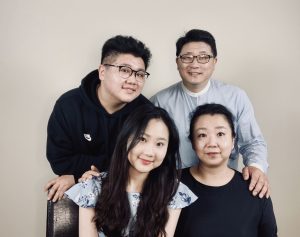Posts Tagged ‘ESL’
What Can I do Now?
Empathy and Skill
“I’ve never been a refugee,” says Jenny Park, “but I feel like we all have moments where you feel like you don’t belong anywhere. For me, it was feeling emotionally displaced sometimes while growing up as an immigrant.”
Jenny joined World Relief as a volunteer tutor in the summer of 2020. Having immigrated to central Indiana from Korea with her family as a Kindergartener, she felt well-equipped to empathize and support other young immigrants, including refugees and asylum-seekers.
“My heart and the experiences I’ve had make me feel especially for young refugees,” she says. “They soak in and pick up the language much faster. They come over and have to be a leader of the family. As an immigrant I went through some of that as well.”

In order to help her family with finances, Jenny began tutoring other Korean immigrants while in high school, working with up to 12 students at one point. Developing this skill prepared her for her work as a volunteer.
“I always knew I wanted to do something to help people,” she says. “When I was little, I was like, ‘OK, I’ll do something to help when I become a doctor.’ But when I started volunteering with World Relief, I asked myself, ‘Well, what can I do now?’ Since I’ve been tutoring so many years already, it was like I kind of had this program inside of me – like how to deal with students and lead the class. That’s how I decided to start tutoring with World Relief.”
Getting Connected
Jenny received training and support from World Relief staff, who connected her with Medina, a young woman from East Africa who speaks four languages and dreams to be an English teacher. Facing barriers related to e-learning during COVID-19, Medina was able to meet consistently with Jenny for extra English practice and homework support through the school year. (Read Medina’s story here.)
“It was rewarding that I was able to make this relationship with Medina,” says Jenny. “It would have been almost impossible for us to meet if it wasn’t for this virtual world we’re all living in due to COVID…When you become a helper, it’s really easy to feel like it’s a weird, hierarchical position. But I feel like we’ve created a beautiful friendship...”
As a volunteer in World Relief’s Youth Program, you’ll be equipped to put your skills and life experience to use. You’ll have the opportunity to walk alongside young people like Medina as they lay a foundation for life in the United States. Most importantly, you’ll be invited to become not just a helper, but a friend.
Writing and interview by Jacob Mau
Love Disrupts: Rodney’s Story
“We are enamored with a gospel that comforts us, but we are rarely drawn to a gospel that disrupts us.”
– Eugene Cho, Thou Shall Not Be a Jerk
Rodney is a husband and a father. He goes to church and home-schools his kids. He loves God and loves others, but when it came to immigration, Rodney felt it might be best if the U.S. stopped allowing more people to come here.
“[I would] see the big headlines saying that an illegal alien broke into someone’s house,” he said, “or [I’d] hear something about MS13 without context. You get to the point where you start to put all people into the same category.”
Rodney was comfortable with his views on immigrants and refugees, that is, until God disrupted his life.
It was a perfectly ordinary Sunday when David Frazier, founder of World Relief Memphis’ Connect English Language Center, spoke at First Evangelical Church in Memphis, Tennessee. Rodney’s son, James, was in attendance, and he listened as David spoke about God’s heart for immigrants. After the service, James returned home and told his dad about David’s message and how it was causing him to question his own views on immigration. Rodney was intrigued so he invited David to come speak to his Sunday school class the following week.
“David really pulled back [the curtain] and showed me the facts about who refugees are and the processes in place in terms of vetting that they have to go through,” Rodney said.
After Sunday school, David suggested that Rodney enroll in an orientation program at World Relief Memphis to learn more.
During one of the first classes, Rodney’s instructor passed out index cards to everyone and asked them to make a list of things they would bring with them if they had to leave their homes. After they made their lists, the instructor told everyone to cross one thing off their lists. After a few more rounds, everyone was left with just two or three things they could bring with them.
“[I realized] this is what these refugees have had to do,” Rodney said. “They’ve had to give up things in order to [find] a better life or escape danger where they were. It just made me think, what would I have to give up?
“[The exercise] opened my eyes up to the fact that the people that are here are not trying to…stay in their own groups,” he continued. “They are trying to learn English, trying to assimilate and trying to get jobs. These aren’t people coming just to get something, they’re coming to learn. They’re coming to contribute.”
After finishing the classes, Rodney felt compelled to volunteer. He signed up to serve on Wednesday nights at the Connect Language Center’s Café English, helping ESL students practice their English by simply having conversations with them. At Café English, Rodney connected with refugees and other immigrants and began to feel a palpable sense of shared humanity with them.
A few weeks later, World Relief’s Mobilization Director, Karen Spencer, asked him if he’d be interested in filling the need for a Roadrunner — a volunteer driver who transports refugee and immigrant clients to and from ESL classes and other appointments they have. Without hesitation, Rodney said yes and began driving World Relief’s 15-passenger van three days a week. According to Rodney, this was simply the next step God had asked him to take, and spending time with clients in the car allowed him to foster deeper connections with them.
“One of the first groups of ladies I [drove to ESL class] came close to my 29th wedding anniversary,” Rodney recalled. “So I asked them to teach me how to say ‘I love you’ in Swahili, which is nakupenda. It was a way to [connect] things from my life [with] theirs.”
After that, Rodney said he and the group of women would say “nakupenda” to each other each time he dropped them off, a sign that a beautiful friendship was forming.
Rodney also got to know the Mto brothers on his drives. They talked to each other about their marriages and hobbies, and as they grew more comfortable with each other, one of the brothers approached Rodney and asked if he would help him learn how to drive.
Rodney admits that he was hesitant at first.
“There was the human instinct [in me] that said maybe this is going too far,” he said.
But he had been asking God to make him open to new opportunities. When he remembered that prayer he thought, “God, I asked you to make me open, so, okay.’”
He picked up some books from the Connect Language Center that would help the Mto brothers study for their permit test and began studying with them. Eventually, Rodney invited the brothers over for dinner after their study sessions and the men became close friends with both Rodney and his son. One night, Rodney even took the brothers out for pizza and to drive go-karts so they could safely practice driving!
Recently, Rodney said that Patrick, one of the brothers, texted him saying, “Big! I’m ready to drive!”
“My nickname is Big Rod,” Rodney laughed, “but he can’t remember the ‘Rod’ so he just calls me Big.”
At World Relief, we often talk about the opportunity for mutual transformation. Because of his willingness to take a leap of faith, Rodney experienced a significant mindset shift and has been blessed tremendously by being a source of friendly welcome for so many refugees and immigrants in Memphis.
“The thing that has gotten me more than anything else,” Rodney said, “is that there are missionaries that are called by God and go to a certain country. I’m being a missionary here. I’ve met people from Columbia, Venezuela, Guinea, the Democratic Republic of the Congo. I’ve learned these people’s names. I’ve gotten to talk to them, find out about their families, what they like to cook, etc. It’s something that I’ve really enjoyed and it’s ever-expanding.
“It is not so much that you have the ‘skills’ when you come to this job,” he continued. “It’s that you open yourself up to God and say, ‘Take everything that I am, and use me for your glory in this position.’ So, it’s all about being open to God… Be open, and let God use you to be who he created you to be.”
Rodney’s story is a refreshing reminder of what God can do when we open ourselves up to his transformative, often disruptive love. May we all be a little more like Rodney and courageously let that love in.

Nathan Spencer is a former Communications Intern for World Relief Memphis. A recent graduate of the University of Memphis, Nathan continues to volunteer for World Relief as a copywriter.
How a grateful Syrian family has resettled in the US
Rami never expected the devastation that would hit his homeland and his family in 2011. After high school, Rami went to university to finish his associates in veterinary science and began assisting a veterinarian by providing vaccinations and caring for cows and chickens.
Everything began to change when the Syrian revolution started in March of 2011. Protests increased as the government and police counteracted and things became increasingly violent. From their home, Rami’s family could hear the gunfire as it moved through the city and ultimately to their neighborhood.
Rami fled to neighboring Turkey, found work as an air conditioner repairman and sent for his wife and children. Rami remembers being treated poorly because he and his family were Syrian refugees. He began applying to the UN, was referred for resettlement to the US and he and his family arrived in Aurora, Illinois in 2015.
“I thank God for being able to come to the US because I know that many people do not have the chance.”
Rami hopes to continue his education in the future and return to working with animals.
Read more of Rami’s story here.
Support refugees like Rami and his family.




